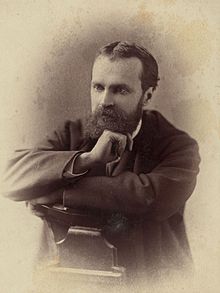Behaviorism
Appearance
(Redirected from Behavioralistic approach)

Behaviorism (or behaviourism) is an approach to understanding human and animal behavior which assumes all behaviors are responses to stimuli.
Quotes
[edit]- According to Mr. Walter Lippmann, the belief the modern man has lost is "that there is an immortal essence presiding like a king over his appetites." This immortal essence of which Mr. Lippmann speaks is, judged experimentally and by its fruits, a higher will. But why leave the affirmation of such a will to the pure traditionalist? Why not affirm it first of all as a psychological fact, one of the immediate data of consciousness, a perception so primordial that, compared with it, the denial of man's moral freedom by the determinist is only a metaphysical dream? The way would thus be open for a swift flanking movement on the behaviorists and other naturalistic psychologists, who are to be accounted at present among the chief enemies of human nature.
- Irving Babbitt, "What I Believe" (1930), Irving Babbitt: Representative Writings (1981), pp. 9-10
- [American] optimism is a national strength and is connected with our original project of mastering of nature. But that project itself is not unproblematic and makes sense only when kept within limits. One of these is the sanctity of human nature. It must not be mastered. ... Human nature must not be altered in order to have a problem-free world. Man is not just a problem-solving being, as behaviorists would wish us to believe, but a problem-recognizing and -accepting being.
- Allan Bloom, The Closing of the American Mind (New York: 1988), p. 229
- Granting, I say that competition has hitherto been the universal law, the last word, of nature, still if only one man should stand up and say, "It shall be so no more," if he should say, "It is not the last word of my nature, and my acts and life declare that it is not," then that so-called law would be at an end.
- Edward Carpenter, England's Ideal: And Other Papers on Social Subjects (1887) p. 54
- Suppose that an engineer is presented with a device whose functioning he does not understand, and suppose that through experiment he can obtain information about input-output relations of this device. He would not hesitate, if rational, to construct a theory of the internal states of the device and to test it against further evidence. ... By objecting, a priori, to this research strategy, Skinner merely condemns his strange variety of “behavioral science” to continued ineptitude.
- Noam Chomsky, "The Case Against B. F. Skinner", The New York Review of Books, December 30, 1971
- If men were the automatons that behaviorists claim they are, the behaviorist psychologists could not have invented the amazing nonsense called “behaviorist psychology.”
- Robert A. Heinlein, Time Enough for Love (1973)
- Freudian concepts exposed the fraud of the existence of the “individual.” To be absolutely clear here: the Freudian concepts expose the fraud, not so as to perpetuate it, but undo it. That is, unlike the mechanical behaviorists, the point was not to prove that the individual was an illusion; rather it was to show to what extent the individual did not yet exist.
- Russell Jacoby, Social Amnesia (1975), p. 30
- According to the general postulate of psychology just referred to, there is not a single one of our states of mind, high or low, healthy or morbid, that has not some organic process as its condition. ... To plead the organic causation of a religious state of mind, then, in refutation of its claim to possess superior spiritual value, is quite illogical and arbitrary, unless one have already worked out in advance some psycho-physical theory connecting spiritual values in general with determinate sorts of physiological change. Otherwise none of our thoughts and feelings, not even our scientific doctrines, not even our dis-beliefs, could retain any value as revelations of the truth, for every one of them without exception flows from the state of their possessor's body at the time.
- William James, The Varieties of Religious Experience, Lecture 1

